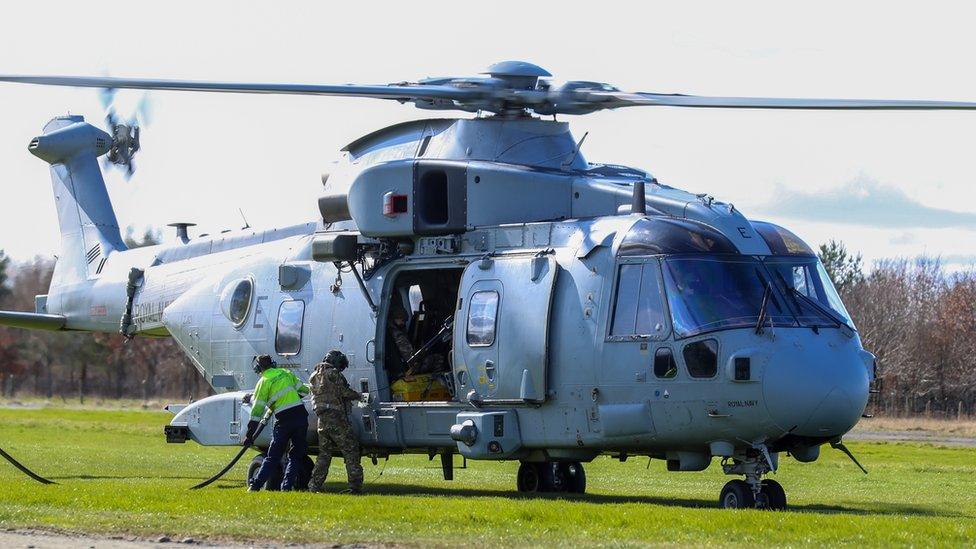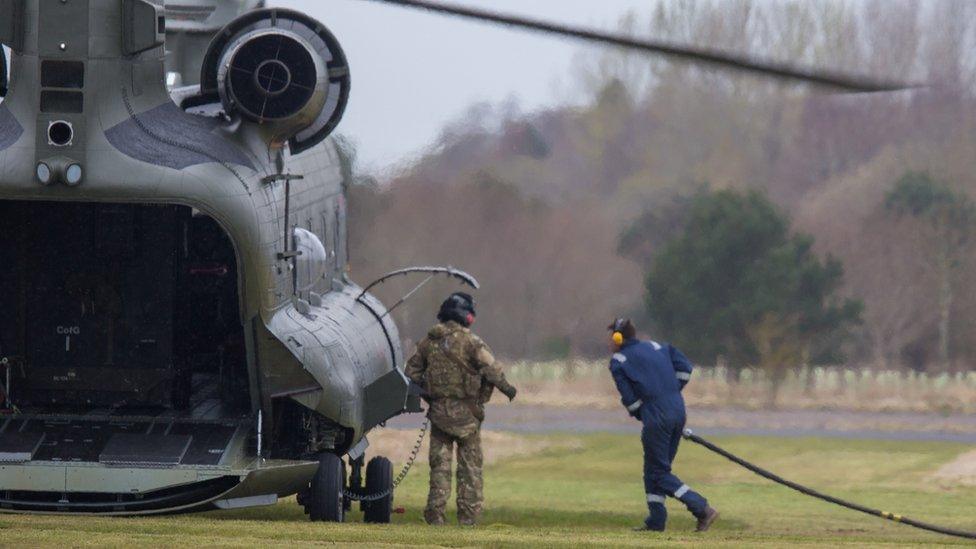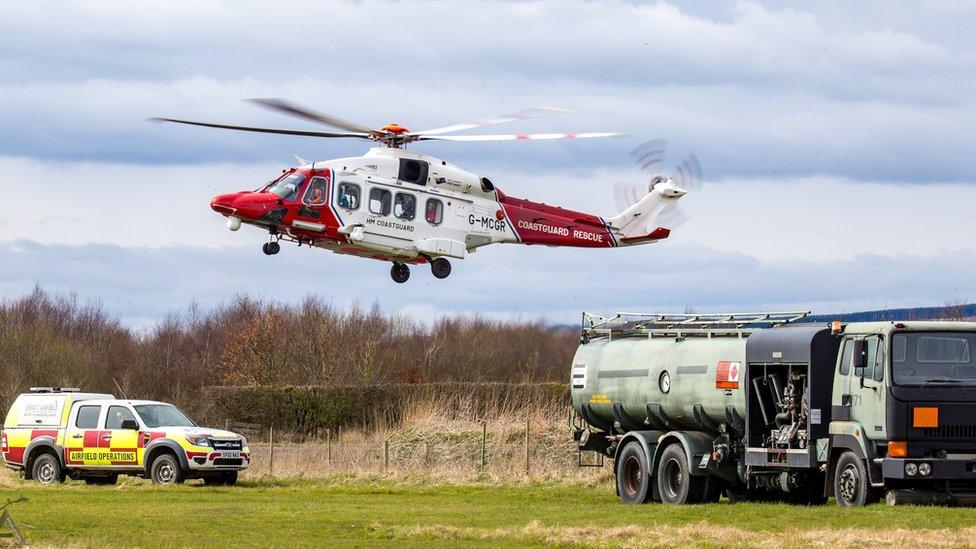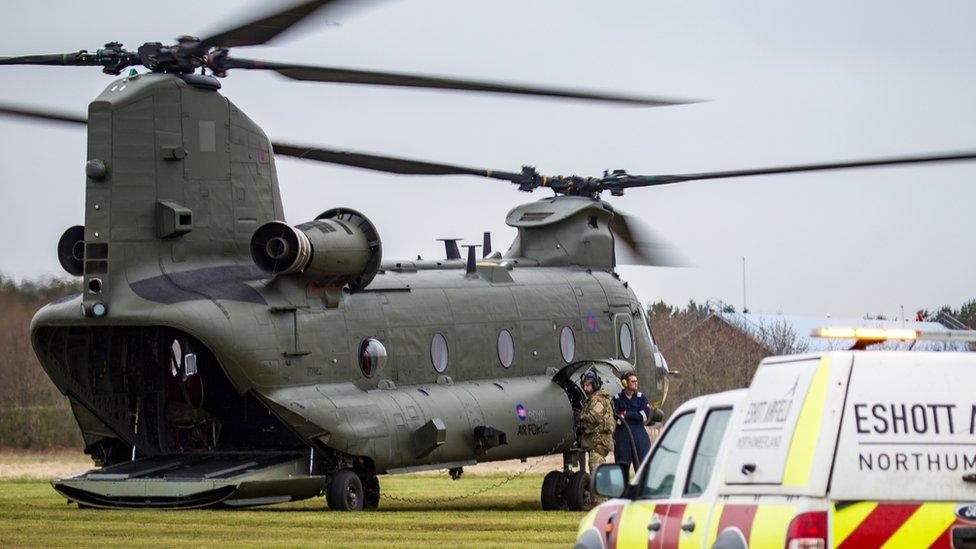Eshott Airfield vows to defy Northumberland Council ban
- Published

Eshott Airfield offers rotors-running refuelling which director Richard Pike said requires regular training
An airfield has vowed to keep letting emergency and military helicopters refuel there despite a council ban.
According to its planning permission, Eshott Airfield in Northumberland can only be used by aircraft smaller than 5.7 tonnes, with the exception of emergency or military vehicles.
Northumberland County Council said no larger aircraft could land there except in an emergency.
Airfield director Richard Pike said landings were needed for training.
In October 2021, the council granted an amendment to the planning condition, external restricting the size of aircraft at Eshott to say: "With the exception of landings/take-offs only by military aircraft, emergency services aircraft and/or aircraft in emergency situations, the airfield shall not be used other than by gliders, microlights, helicopters and propeller driven aircraft.
"No such individual aircraft shall exceed 5,700 kilograms in weight."
Mr Pike said that "clearly" meant emergency services and military aircraft larger than that size could use the airfield in non-emergency situations.

Chinooks are among the military aircraft that refuel at Eshott
But the council's enforcement notice, which Mr Pike said he would appeal against, said it was against the conditions for military aircraft over 5,700kg to use the site "outside of emergency situations" as the larger aircraft were having a "significant detrimental impact" on nearby residents.
The council also said there had been reports of the airfield operating flights outside its authorised hours of 09:00 to 19:00, which was causing an "unacceptable disturbance to the peaceful enjoyment which can be reasonably expected by residents".
Mr Pike said there were "extremely occasional small fixed-wing aircraft movements" outside the hours either because a pilot was unaware of the restrictions or the landing had been delayed by the weather for a "few minutes".
Mr Pike said Eshott is the only airfield in the North East that offers rotors-running refuelling, which sees a helicopter refuelled without the need to switch off its engines. He said that save both time in a potentially "life-saving" search and rescue situation and wear on the aircraft's engines.
He added rotors-running refuelling was potentially dangerous and staff needed regular training with the aircraft they would be dealing with in emergency situations at 15 minutes' notice.

HM coastguard helicopters based in Prestwick in Scotland and Humberside sometimes refuel at Eshott
He said the airfield, which began life as a Spitfire training base in World War Two, was an important fuelling point for search and rescue operations over the North Sea and military training exercises in Northumberland.
Mr Pike said: "We will continue to support the RAF and all aspects of the military and coastguard even if they fine us.
"We will take this all the way to court if we have to as we believe the wording of the planning permission very clearly allows us to do this, never mind the moral or public interest argument in supporting these services."
He said according to the council's interpretation, a helicopter responding to a call-out could refuel at Eshott but one that had completed a mission would be unable to stop there even if it had insufficient fuel to return to its base.
He said the landing of large helicopters was infrequent with less than one a month, and when one did arrive as part of a training exercise it would be done in the day during the airfield's authorised operating hours with it being "very loud for 15 minutes".

Eshott Airfield is used by both the coastguard and the military for rotors-running refuelling
A council spokesman said the authority remained "fully supportive for the airfield to be used by military and air-sea rescue aircraft in genuine emergencies".
He added: "However, in ongoing dialogue with the airfield operators we've been clear the site is not currently considered suitable for regular commercial refuelling of heavy aircraft."
He also said the enforcement notice sought to "address issues around the airfield operating outside its agreed business hours".
A Maritime and Coastguard Agency spokeswoman said it operated with Civil Aviation Authority rules and would "assess accessibility of airfields - such as Eshott - on a case-by-case basis to assist in search and rescue operations".
The Ministry of Defence has been contacted for comment.

Follow BBC North East & Cumbria on Twitter, external, Facebook, external and Instagram, external. Send your story ideas to northeastandcumbria@bbc.co.uk, external.